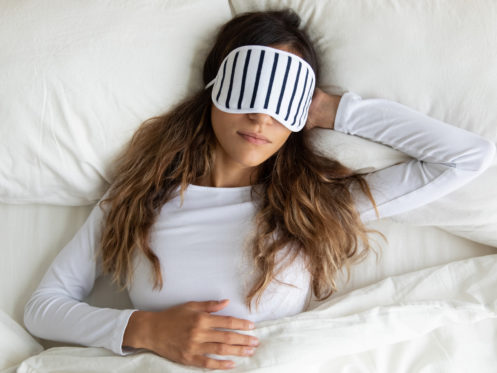Sticking to a schedule, avoiding caffeine and staying away from all your electronic devices are the usual tips for getting a good night’s sleep. However, finding the right temperature for rest is the most crucial step to improving your slumber. How can you find your ideal temperature for sleep? Let’s consider some facts.
How Does Temperature Affect Sleep?
Temperature affects our sleep on two levels. The first level has something to do with being comfortable enough to rest. When it is too cold or hot, you will find it very difficult to fall asleep. The second level, which is the deeper one, pertains to a complex relationship between our body’s internal system and how it responds to external temperatures. Our core body temperature changes throughout the day and night in a predictable pattern that controls how we respond to sleep.
The predictable pattern is known as the circadian rhythm. It starts when our core body temperature is at its lowest, about two to three hours before waking up. Then, it begins to increase as we wake and continues to do so over the course of the day until it peaks roughly two to three hours before we start to feel sleepy. In essence, this rhythm controls our wakefulness and then prepares our body to rest.
The cooling of our internal temperature is a major part of what makes us fall asleep. This is why people who have insomnia are often advised to take a hot bath or sit in a hot tub for some minutes before bedtime. Of course, doing this takes you through the two levels required to sleep. You get relaxed and comfortable before bed while also helping your core temperature to peak and then suddenly drop when you get out of the bath. This cools your core and helps to make you feel sleepy.
The Relationship Between Your Sleep Cycles and Room Temperature
Sleep helps your body recuperate and your brain process all the necessary information in readiness for the next day. In fact, it’s not coffee that keeps you going in the morning but the quality of your sleep. We have two major types of sleep cycles that interchange throughout the night. They are non-rapid eye movement (NREM) and rapid eye movement (REM) cycles.
The N1 Phase of NREM Sleep
Just before you fall asleep, your brain produces alpha and theta waves. This makes your eyes feel heavy, and you start drifting off to sleep. This state is meant to calm you down, giving your brain a break from processing information accumulated during the day. Since your brain is relaxed, your muscles start to lose control slowly. That’s why you can find yourself experiencing a falling sensation or muscle spasms. This phase lasts from 5 to 10 minutes.
The N2 Phase of NREM Sleep
This is where your body temperature starts to drop, your heart rate slows down and your eyes stop rolling. Your brain produces waves that signal complex activities of information processing during sleep. It is quite difficult to wake someone up in this phase. It goes on for about 25 minutes before you enter the next level of NREM sleep.
The N3 Phase of NREM Sleep
Your brain produces delta waves at this phase, preparing you for REM sleep. Your body becomes less sensitive to the external environment. This is when your body repairs your tissues, boosts your immunity, and starts growing new cells. It takes about 45 to 90 minutes.
The REM Stage
This is the most important stage for your brain. Unlike NREM, in which brain waves slow down, during REM sleep, the brain is very active and giving off mixed frequencies. Your brain processes and stores all the important information you have learned, making it easy to recall. This is also the stage when dreams occur. Your eye movement, blood pressure and heart rate increase at this stage while your skeletal muscles are paralyzed.
From this process, you can see that your body needs to drop the core temperature to a certain level during the NREM N2 phase before you start benefitting from your sleep. For a richer sleep, once your body finds that temperature, it shouldn’t be interrupted until the moment you wake up.
How Do You Find Your Optimal Sleeping Temperature?
Experts recommend that the ideal temperatures for sleep ranges from around 60 to 72 degrees Fahrenheit. Consider setting your thermostat to about 66 degrees Fahrenheit and see how you proceed from there.
There are factors that you should consider when finding your ideal temperature. They include the following.
Cold Climate
If you live in a cold area, it is advisable to set your thermostat to about 68 degrees for optimal sleeping. However, if you are still finding it too cold, turn it up a few notches to 70 degrees, or add an extra layer of blankets to keep you warm. If you find the right temperature that is comfortable enough for you, stick to it. Changing it will affect your sleep cycles.
Hot Weather
It can be tough to sleep in a climate with predominately hot weather. It is not only uncomfortable, but it also makes it difficult for your body to switch from NREM sleep to REM sleep. Experts suggest that if you live in such an area, you should set your thermostat to somewhere between 72 and 75 degrees instead of the ideal 66 degrees. The reason for this is to balance finding the right sleeping temperature with keeping your energy bills in check. Of course, if you are too hot at this temperature, you should certainly adjust it downward until you arrive at a comfortable setting. And if you are experiencing any problems with your unit, you can reach out to Buehler Air Conditioning in Jacksonville Beach.
Besides using your HVAC unit, there are some other ways to sleep better when the temperature is hot. During the day, keep the warm air out of your sleeping rooms. You can achieve this by closing the curtains and blinds during the hot times of the day. When the air outside starts to cool, usually in the evening, open them back up. If it’s cool enough, open the windows as well and let the breeze in. In a safe area, you can even keep them open all night.
Also, consider sleeping closer to the ground. Hot air is light and will always rise up in the room, whereas cool air is denser and will always be near the floor. Therefore, try to sleep as low as possible when living in a hot climate. Experts advise that you should consider moving downstairs until the hot summer is over.
Finally, reduce the amount of clothing and bedding you use when sleeping. Also, make sure that your sheets, comforter, pillows and sleeping attire are breathable to let cool air in and the heat from your body out.
Help Your Body Adjust for Sleep
You can also help your body control the circadian rhythm by being kind to your internal thermostat. Our circadian rhythm is sensitive to fluctuations in diet, exercise and light. Therefore, properly timing your activities can positively affect your core temperature. For example, avoiding exercise, alcohol, caffeine and any other food three or more hours before your bedtime can help you sleep better. Since core temperature originates from your internal organs, keeping your digestive system active can interfere with the process of your body preparing for sleep.
Contact Heating and Cooling Experts
Sleep is at the core of your existence. Your brain and body need to refresh, heal, grow and rejuvenate in preparation for the next day. Our experts at Buehler Air Conditioning can help you achieve the best kind of sleep through our heating and cooling services. We offer AC and furnace repair, maintenance and installation to clients throughout the Jacksonville area. Our team can also help improve your indoor air quality. Call us today to set up an appointment or learn more about our services.




